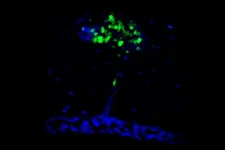Expression of 'fat' genes correlate with metabolic, behavioral changes linked to obesity
New study identifies a constellation of genetic variants in FTO, which in turn influence expression of IRX3 and IRX5, collectively mediating risk of obesity
2021-06-03
(Press-News.org) A collection of genetic variants influences the expression of obesity-associated genes in both the brain and fat tissue, according to a new study from researchers at the University of Chicago. The research team found that changes in the expression of the obesity-associated genes correlated with both metabolic and behavioral changes, suggesting that these variants produce combinatorial effects that increase the risk of obesity. The results, which scientists hope will lead to better understanding of the mechanisms that make some people more susceptible to obesity, were published June 4 in END
ELSE PRESS RELEASES FROM THIS DATE:
Studies reveal skull as unexpected source of brain immunity
2021-06-03
The immune system is the brain's best frenemy. It protects the brain from infection and helps injured tissues heal, but it also causes autoimmune diseases and creates inflammation that drives neurodegeneration.
Two new studies in mice suggest that the double-edged nature of the relationship between the immune system and the brain may come down to the origins of the immune cells that patrol the meninges, the tissues that surround the brain and spinal cord. In complementary studies published June 3 in the journal Science, two teams of researchers at Washington University School of Medicine in St. Louis unexpectedly found that many of the immune cells in the meninges come from bone marrow in the skull and migrate to the brain through special channels without passing through ...
Antarctica wasn't quite as cold during the last ice age as previously thought
2021-06-03
CORVALLIS, Ore. - A study of two methods for reconstructing ancient temperatures has given climate researchers a better understanding of just how cold it was in Antarctica during the last ice age around 20,000 years ago.
Antarctica, the coldest place on Earth today, was even colder during the last ice age. For decades, the leading science suggested ice age temperatures in Antarctica were on average about 9 degrees Celsius cooler than at present.
An international team of scientists, led by Oregon State University's Christo Buizert, has found that while parts of Antarctica were as cold as 10 degrees below current temperatures, temperatures over central East Antarctica were only 4 to 5 degrees ...
NIH researchers identify potential new antiviral drug for COVID-19
2021-06-03
The experimental drug TEMPOL may be a promising oral antiviral treatment for COVID-19, suggests a study of cell cultures by researchers at the National Institutes of Health. TEMPOL can limit SARS-CoV-2 infection by impairing the activity of a viral enzyme called RNA replicase. The work was led by researchers at NIH's Eunice Kennedy Shriver National Institute of Child Health and Human Development (NICHD). The study appears in Science.
"We urgently need additional effective, accessible treatments for COVID-19," said Diana W. Bianchi, M.D., NICHD Director. "An oral drug that prevents SARS-CoV-2 from replicating would be an important tool for reducing the severity of the disease."
The ...
New method accurately reflects hotspots in epidemic
2021-06-03
A new method to monitor epidemics like COVID-19 gives an accurate real-time estimate of the growth rate of an epidemic by carefully evaluating the relationship between the amount of viruses in infected people's bodies, called the viral load, and how fast the number of cases is increasing or decreasing.
"This new method, which effectively links what we know about how the virus grows within the body to the dynamics of how the virus spreads across a population, provides a brand new metric that public health officials, policy makers, and epidemiologists will be able to use to get up-to-date real-time information on the epidemic," said Michael Mina, assistant professor of epidemiology at Harvard T.H. Chan School of Public Health ...
Study on heavy drinking in young adults and the psychological impacts of COVID-19
2021-06-03
HAMILTON, ON (June 3, 2021) - A novel longitudinal study on heavy drinking in young adults and the psychological impacts of COVID-19 has revealed some unexpected findings that challenge preconceived notions regarding pandemic-related alcohol use.
In a sample of nearly 500 young adults ranging in age from 18 to 25, researchers saw a reduction in problematic drinking and alcohol consequences during the initial phase of the pandemic for both men and women. This is in contrast to many anecdotal reports of increased drinking and increased household spending on alcohol during that time period.
More startling, however, were the additional findings that showed increased rates of depression and anxiety symptoms among young women - increases that ...
Immune therapy after surgery lowers relapse risk in patients with high-risk melanoma
2021-06-03
PORTLAND, OR - Patients with high-risk melanoma who had a course of pembrolizumab after their surgery had a longer time before their disease recurred than patients who got either ipilimumab or high-dose interferon after surgery. These findings of a large SWOG Cancer Research Network clinical trial, S1404, will be presented at the ASCO annual meeting June 6, 2021.
Researchers also measured overall survival and found no statistically significant difference in overall survival rates between the two groups of patients three and one-half years after the last patient enrolled to the trial. They did find, however, that patients taking pembrolizumab had fewer serious side effects than those treated with either high-dose interferon or ipilimumab.
The S1404 trial ...
New technology 'listens' for endangered right whales
2021-06-03
One of the world's most endangered whale species could have added protection from threats posed by human marine activity, through technology developed by the University of East Anglia (UEA).
In partnership with the Scottish Association for Marine Science (SAMS) and the marine survey company Gardline Geosurvey Limited, UEA researchers have developed machine learning techniques that can be used to detect the presence of North Atlantic right whales by listening for the sounds they make underwater.
Detecting the animals' presence before they reach close proximity ...
Underwater ancient cypress forest offers clues to the past
2021-06-03
When saber-toothed tigers, woolly mammoths and giant sloths roamed North America during the last Ice Age about 18,000 to 80,000 years ago, the Gulf Coast's climate was only slightly cooler, more similar to regions to the north like Missouri and North Carolina's climate today. As sea level dropped and exposed more land on the continental shelf, bald cypress trees became established in swamps in what is now the northern Gulf of Mexico.
An event occurred and suddenly killed and buried the bald cypress forests along the Gulf Coast. The buried swamp trees were preserved by sediment for thousands of years. About 18,000 years ago, sea level rose. As the ocean waters moved inland, the buried trees were preserved in their ...
Negative relationships linked to worse physical and mental health in postpartum women
2021-06-03
HOUSTON - (June 3, 2021) - Postpartum women in bad romantic relationships are not only more likely to suffer symptoms of depression, they are also at greater long-term risk of illness or death, according to new research from Rice University, Ohio State University and the University of California, Irvine.
"Longitudinal changes in HRV across pregnancy and postpartum: Effect of negative partner relationship qualities" will appear in the July 2021 edition of Psychoneuroendocrinology. The researchers examined how relationships and partner behavior are linked to depression and heart rate variability (HRV) in women between the third trimester of pregnancy and one year postpartum.
"The quality ...
New tech predicts chemotherapy effectiveness after one treatment
2021-06-03
While early detection of breast cancer is critical, early prediction of how well the neoadjuvant chemotherapy treatment before surgery is working also may provide a window of opportunity when treatment could be altered and have a big impact on the patient's quality of life.
An interdisciplinary team of researchers at Washington University in St. Louis has found that combining data from tumor biomarkers, ultrasound, and ultrasound-guided diffuse optical tomography (DOT) after a patient's first cycle of pre-surgical neoadjuvant chemotherapy provided a highly accurate prediction of how the tumor was responding to the treatment. The results from a clinical trial at Washington University School of Medicine and Barnes-Jewish ...
LAST 30 PRESS RELEASES:
Scientists reveal our best- and worst-case scenarios for a warming Antarctica
Cleaner fish show intelligence typical of mammals
AABNet and partners launch landmark guide on the conservation of African livestock genetic resources and sustainable breeding strategies
Produce hydrogen and oxygen simultaneously from a single atom! Achieve carbon neutrality with an 'All-in-one' single-atom water electrolysis catalyst
Sleep loss linked to higher atrial fibrillation risk in working-age adults
Visible light-driven deracemization of α-aryl ketones synergistically catalyzed by thiophenols and chiral phosphoric acid
Most AI bots lack basic safety disclosures, study finds
How competitive gaming on discord fosters social connections
CU Anschutz School of Medicine receives best ranking in NIH funding in 20 years
Mayo Clinic opens patient information office in Cayman Islands
Phonon lasers unlock ultrabroadband acoustic frequency combs
Babies with an increased likelihood of autism may struggle to settle into deep, restorative sleep, according to a new study from the University of East Anglia.
National Reactor Innovation Center opens Molten Salt Thermophysical Examination Capability at INL
International Progressive MS Alliance awards €6.9 million to three studies researching therapies to address common symptoms of progressive MS
Can your soil’s color predict its health?
Biochar nanomaterials could transform medicine, energy, and climate solutions
Turning waste into power: scientists convert discarded phone batteries and industrial lignin into high-performance sodium battery materials
PhD student maps mysterious upper atmosphere of Uranus for the first time
Idaho National Laboratory to accelerate nuclear energy deployment with NVIDIA AI through the Genesis Mission
Blood test could help guide treatment decisions in germ cell tumors
New ‘scimitar-crested’ Spinosaurus species discovered in the central Sahara
“Cyborg” pancreatic organoids can monitor the maturation of islet cells
Technique to extract concepts from AI models can help steer and monitor model outputs
Study clarifies the cancer genome in domestic cats
Crested Spinosaurus fossil was aquatic, but lived 1,000 kilometers from the Tethys Sea
MULTI-evolve: Rapid evolution of complex multi-mutant proteins
A new method to steer AI output uncovers vulnerabilities and potential improvements
Why some objects in space look like snowmen
Flickering glacial climate may have shaped early human evolution
First AHA/ACC acute pulmonary embolism guideline: prompt diagnosis and treatment are key
[Press-News.org] Expression of 'fat' genes correlate with metabolic, behavioral changes linked to obesityNew study identifies a constellation of genetic variants in FTO, which in turn influence expression of IRX3 and IRX5, collectively mediating risk of obesity




